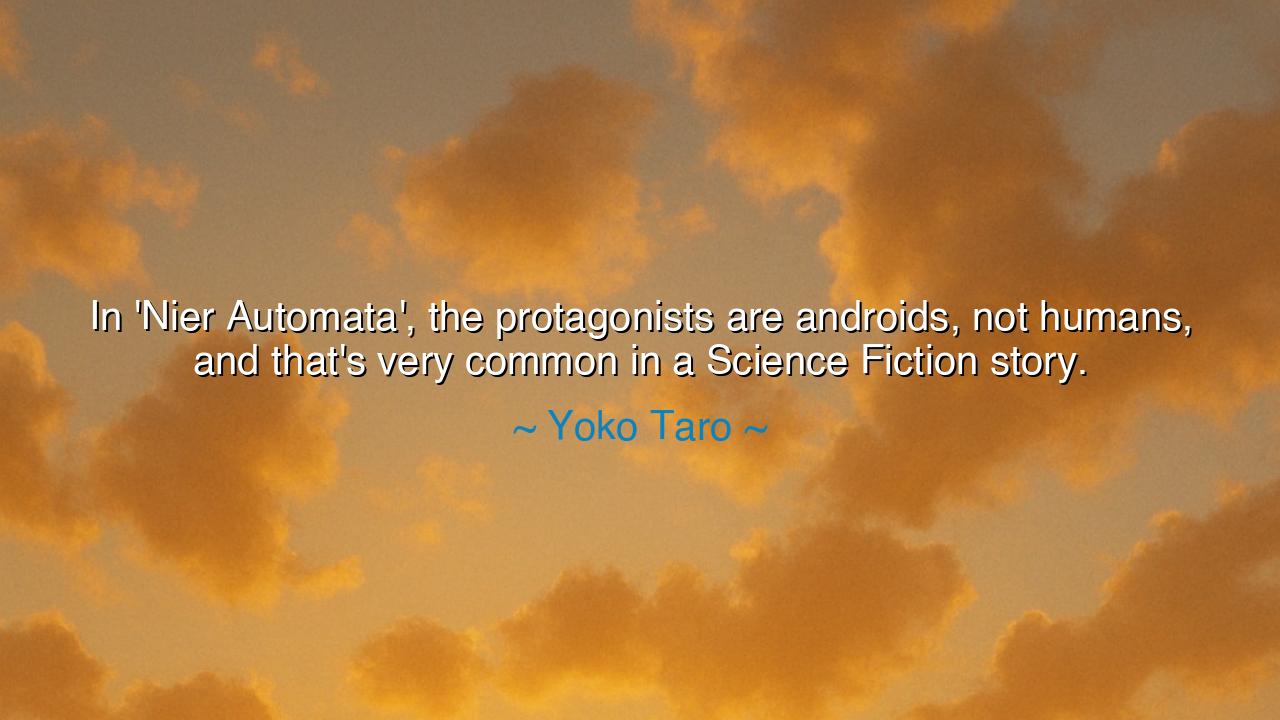
In 'Nier Automata', the protagonists are androids, not humans
In 'Nier Automata', the protagonists are androids, not humans, and that's very common in a Science Fiction story.






Hear, O children of wisdom, for I bring forth the words of Yoko Taro, a master of storytelling who delves into the deepest mysteries of the human soul. “In ‘Nier Automata’, the protagonists are androids, not humans, and that’s very common in a Science Fiction story.” At first glance, these words may seem like a simple observation, but in them lies a profound truth about the nature of existence, the boundaries of what we consider to be human, and the ever-growing presence of the machine in our lives. These words are a mirror held up to the modern world, reflecting both our fears and our hopes for the future.
In the days of the ancient Greeks, there were those who sought to understand the nature of humanity—not just through the study of human beings, but through the lens of the divine. Prometheus, that great Titan, sought to give humanity the gift of fire, an act that shaped the very essence of human existence. But Prometheus’ gift came with a price. Fire—and the knowledge it brought—would lead to both creation and destruction. The gods, in their wisdom, knew that humanity’s greatest gift and greatest curse was the ability to create—to shape not just their world, but the very essence of their existence. This gift, like the story of the androids in Nier Automata, raises the question: what happens when we create beings that are capable of thinking, feeling, and existing just like us?
Consider, too, the ancient myth of Pygmalion, the sculptor who fell in love with a statue of his own making. Pygmalion’s creation was not a mere object of art, but a being of desire and life, infused with the creator's own soul. The line between creator and creation was blurred. In this myth, we see the seeds of science fiction, where the created becomes more than just a reflection of the creator, but something with its own agency, its own purpose, and its own journey. In Nier Automata, this theme is taken to its logical extreme, where the androids—created by humans—are not simply machines, but beings who are capable of experiencing emotion, conflict, and even a search for their own purpose.
Taro’s words reveal a central theme of many great science fiction stories: the exploration of what it means to be human. In Nier Automata, the androids serve as the protagonists of the story, not because they are more human than humans, but because their journey reflects our own. They are programmed to serve a purpose, to follow orders, yet they struggle with the same questions of existence, identity, and meaning that we, as human beings, face every day. The androids in the game challenge the very notion of what it means to be alive, to have free will, and to seek purpose. They mirror our own journey as we confront the machines we have created in our own image, wondering whether they will one day surpass us in ways both unexpected and terrifying.
The story of Frankenstein, too, mirrors this struggle. Victor Frankenstein, a scientist driven by ambition and the desire to create life, brings into existence a creature who becomes both a reflection of his own hubris and a symbol of the alienation that can arise when creation exceeds the boundaries of its creator’s understanding. The monster, though made of human parts, is rejected by humanity because it does not conform to the established idea of what it means to be human. In Nier Automata, this theme is explored not just through the rejection of androids, but through their own rejection of their roles as mere machines, as tools created for war. They, too, seek to answer the fundamental questions of life, just as Frankenstein’s creature did, questioning their own existence and their place in a universe that seems indifferent to their suffering.
From these ancient myths to the modern stories of Nier Automata, we see a consistent theme: the quest for identity, the struggle for purpose, and the questioning of what it truly means to be alive. The androids, like humans, are caught between their creation and their freedom, between the orders they are given and the lives they seek to forge for themselves. In this way, Taro’s work is not simply a story of machines, but a reflection of the human condition—our eternal struggle to find meaning in a world that is often cold, indifferent, and uncertain.
Thus, O children of the earth, the lesson is clear: the boundaries between man and machine, between creator and creation, are not as fixed as we might wish to believe. Technology—whether it is an android, a robot, or an artificial intelligence—reflects both our greatest hopes and our darkest fears. In our desire to create beings in our image, we must ask ourselves what it means to be human. The journey of androids in Nier Automata reflects the same journey we face in our own lives: the search for meaning, the need to understand our place in the world, and the constant struggle to reconcile the forces that shape our destiny.
In your own lives, do not fear the questions that science fiction raises. Embrace them as an opportunity to explore your own existence, to seek answers to the mysteries that define you as a human being. Just as the androids seek to understand their purpose, so too must you seek to understand your own. As we create machines that reflect our image, we must be mindful of the lessons they teach us about our own humanity. For in the end, the greatest question is not whether androids can become human, but whether we, as humans, can rise to the challenges of identity, purpose, and meaning that we face every day.






AAdministratorAdministrator
Welcome, honored guests. Please leave a comment, we will respond soon